White bedrooms often get labeled as cold, bland, or… well, hospital-like. But as someone who’s obsessed with home decor (and probably has more throw pillows than necessary), I’m here to tell you white doesn’t have to feel lifeless.
Actually, white bedrooms can be some of the coziest and most sophisticated spaces when styled right. It’s all about balance, layers, and adding soul to your space.
In this guide, I’ll show you five tried-and-tested ways to make your white bedroom feel warm, inviting, and seriously stylish without giving up the crisp freshness that makes white so appealing in the first place.
1. Layered Warm Whites for Softness
Okay, let’s clear one thing up not all whites are the same. I learned this the hard way after accidentally pairing a warm ivory duvet with stark blue-white walls. It looked like my bedding was tea-stained. Not cute.
The trick? Layering different tones of warm whites.
Think creamy whites, eggshells, light ivories, and soft linens. These colors blend together beautifully and add depth that flat, single-tone white rooms totally lack. I personally love using a slightly darker white on the walls, and then adding bedding in soft ecru or warm vanilla tones.
Here’s a simple combo that works every time:
| Element | Suggested White Tone |
|---|---|
| Walls | Soft ivory or warm linen |
| Bedding | Off-white with beige undertones |
| Curtains | Creamy white sheer or linen |
| Rug | Ivory with subtle beige patterns |
This layered look not only feels intentional but also adds warmth without introducing color perfect if you’re committed to an all-white palette but still want it to feel cozy.
Avoid blue-based whites. They look sleek in showrooms, but in real life? Ice cave. Stick to white paints with yellow or red undertones for a softer vibe.
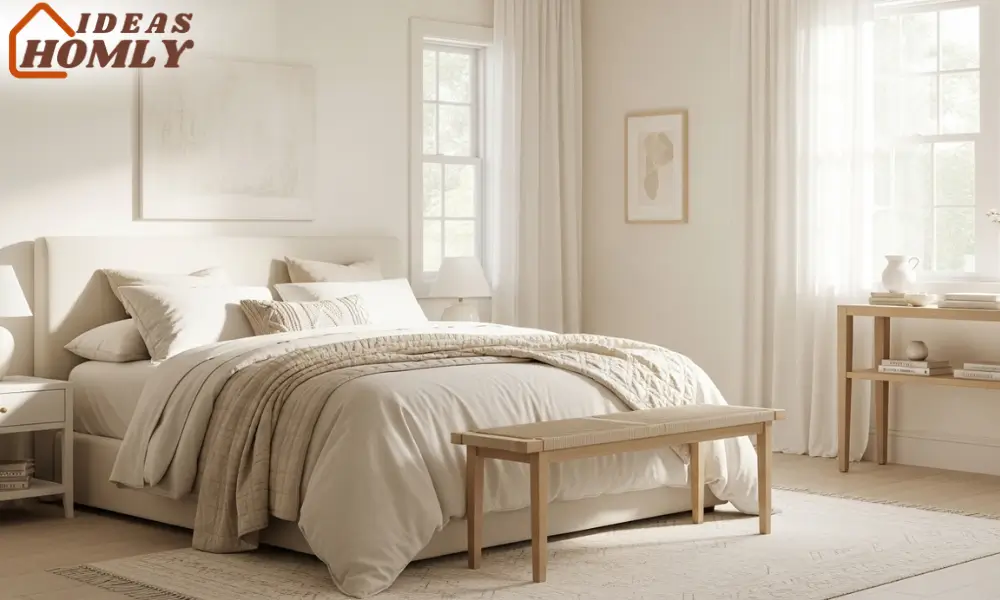
2. White + Earthy Neutral Accents
I’m a huge fan of neutrals. Taupe, greige, tan, camel; they’re basically the best friends white never knew it needed. When I added a tan woven bench at the foot of my bed and a sand-colored lamp on my white nightstand, it instantly warmed things up.
White on its own can feel sterile, but earthy neutrals ground the space and add that “lived-in luxury” feel we all secretly crave. And the best part? These colors never go out of style.
Let me give you a few quick neutral accent ideas that pair flawlessly with white:
- Natural wood nightstands or headboards (light oak, walnut, or rattan)
- Beige linen curtains or textured blinds
- Clay or terracotta accessories (vases, trays, lamps)
- Camel-colored throw blankets or cushions
You don’t need to go overboard. Just 1 or 2 earthy touches can make a massive difference. Trust me, a white room with a woven jute rug instantly feels more welcoming than one with a cold tile floor.
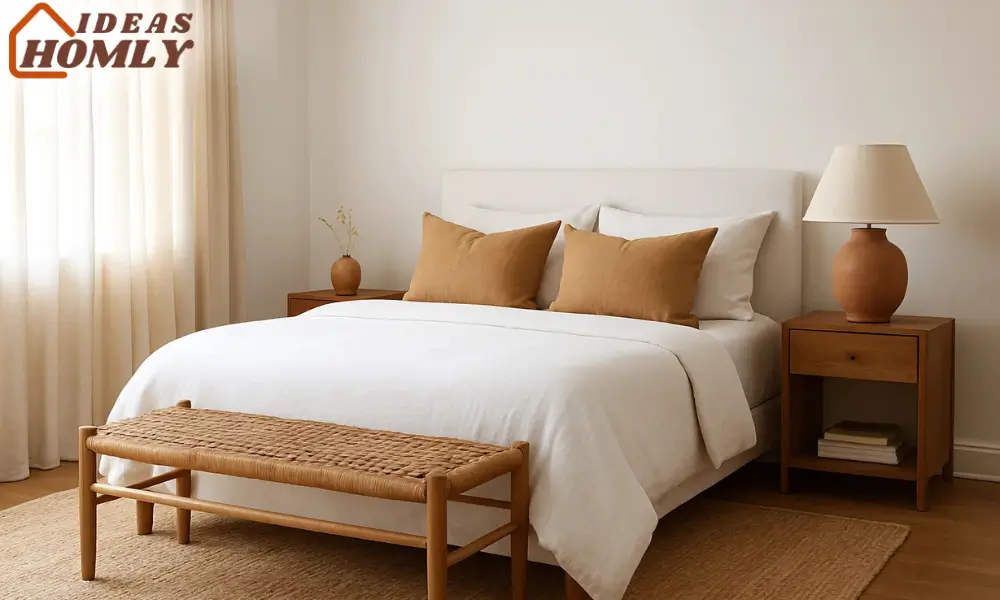
Here’s how these accents help:
| Accent Type | Effect on Space |
|---|---|
| Wood or rattan furniture | Adds texture and warmth |
| Neutral-toned fabrics | Softens the visual coldness |
| Warm-toned ceramics | Brings personality and contrast |
White looks best when it’s got a bit of contrast to play against, and earthy neutrals strike that perfect balance without overpowering the clean aesthetic.
3. White and Charcoal Contrast
Now this one’s for those of us who love a little drama (no, not that kind). Pairing white with charcoal or soft black accents is like giving your bedroom a designer handbag, it instantly adds structure and edge.
When I first tested this combo, I added a charcoal fabric headboard to my plain white bedroom. The result? It popped in the best way possible. The white looked brighter, the room felt cozier, and suddenly my boring white walls had character.
Here’s why it works:
Charcoal anchors the space. It breaks up the all-white look without killing the calm vibe.
You don’t need to paint a black wall (unless you want to, in which case, you’re bold and I love that). You can add charcoal in small but impactful doses:
- A charcoal throw blanket or textured cushion
- Matte black curtain rods or sconces
- A dark-framed artwork or mirror above the bed
- Deep gray rug or bench at the end of the bed
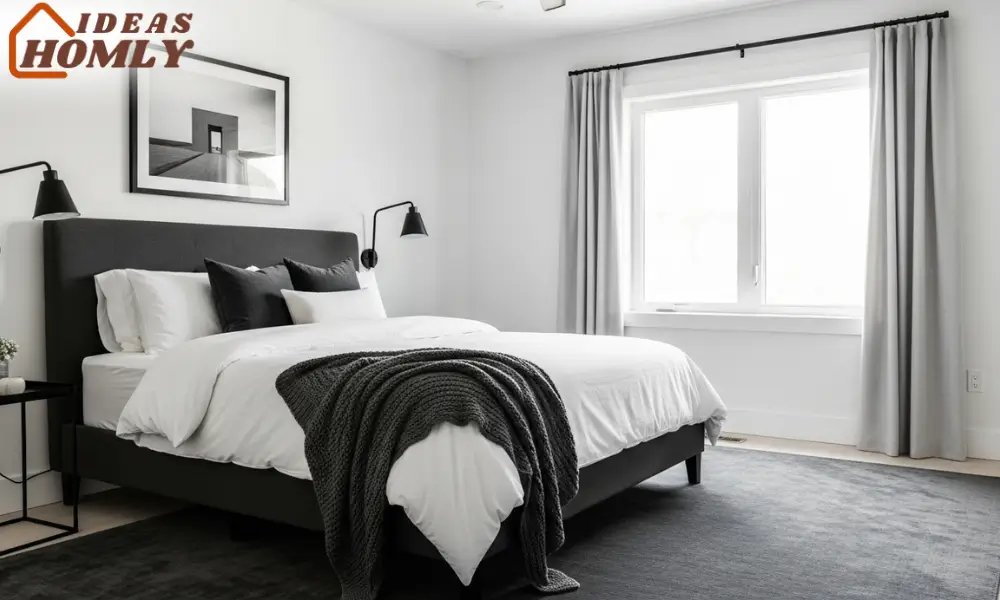
Here’s a simple contrast pairing table for ideas:
| White Element | Charcoal Accent |
|---|---|
| White bedding | Charcoal knit throw blanket |
| White walls | Black metal picture frames |
| White curtains | Charcoal tiebacks or rods |
| White floor rug | Black side table or lamp base |
The contrast doesn’t make the room feel colder, it does the opposite. It defines it. A white room with the right amount of charcoal is calm, modern, and not boring. Promise.
4. White with Natural Textures (Fur, Wool, Jute)
You know how sometimes a space just feels cozy without you being able to explain why? That’s usually because of texture. When you’re working with white, texture is your secret weapon.
One winter, I swapped out my basic white duvet for a chunky knit white blanket and threw a faux fur rug beside the bed. The transformation was instant. It went from flat and lifeless to “oh my gosh I want to hibernate here.”
Textures like fur, wool, jute, and raw linen bring tactile warmth to an otherwise cold white room. Even if you don’t change the color, changing the surface creates cozy layers your eyes (and hands) will thank you for.
Some of my favorite texture-adding ideas:
- A white chunky knit throw on the bed
- Fluffy white or cream faux fur rug underfoot
- Linen or woven jute storage baskets
- Rattan pendant light or nightstand
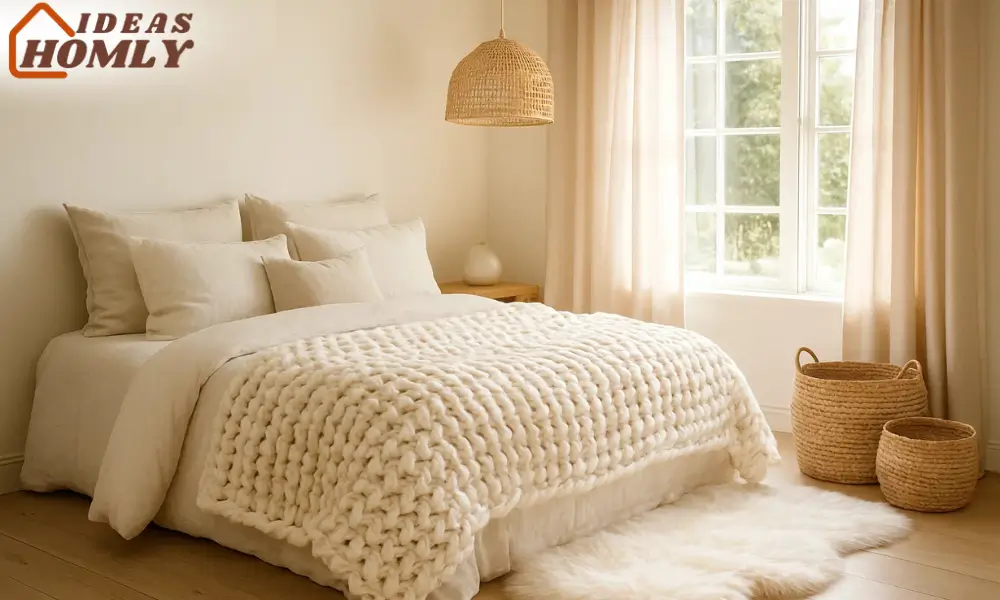
Let’s look at how different textures impact the space:
| Material | Effect in White Bedroom |
|---|---|
| Faux Fur | Adds softness and visual luxury |
| Chunky Knit | Creates a hand-crafted, homey vibe |
| Jute | Brings in nature and earthiness |
| Linen | Feels casual but elegant |
The beauty here is that you can stay true to your all-white vision while keeping the room anything but plain. Texture is subtle, but trust me it speaks volumes.
5. Soft Pastel Additions to White Base
Okay, so maybe you want a splash of color but you’re not ready to commit to bold walls or wild wallpaper. I totally get that. That’s where pastels come in. Think of them as the gentle whisper of color that keeps your white room from whispering too quietly.
Adding soft pastel tones like blush pink, powder blue, sage green, or lavender gives your white bedroom a cheerful, calm personality. And the best part? You can switch them out whenever your mood changes.
I once had a phase where I was obsessed with dusty pink. I added pink pillowcases and a pastel ceramic vase. It looked Pinterest-worthy without me needing to change the walls or furniture. When I got over it (sorry, pink), I swapped in soft sage accessories instead.
Here are some ways to introduce pastels tastefully:
- A pastel quilt or bedsheet layered over white bedding
- Pale-toned lamps or bedside accessories
- Light pastel artwork or wall hangings
- Pastel cushions paired with white and beige ones
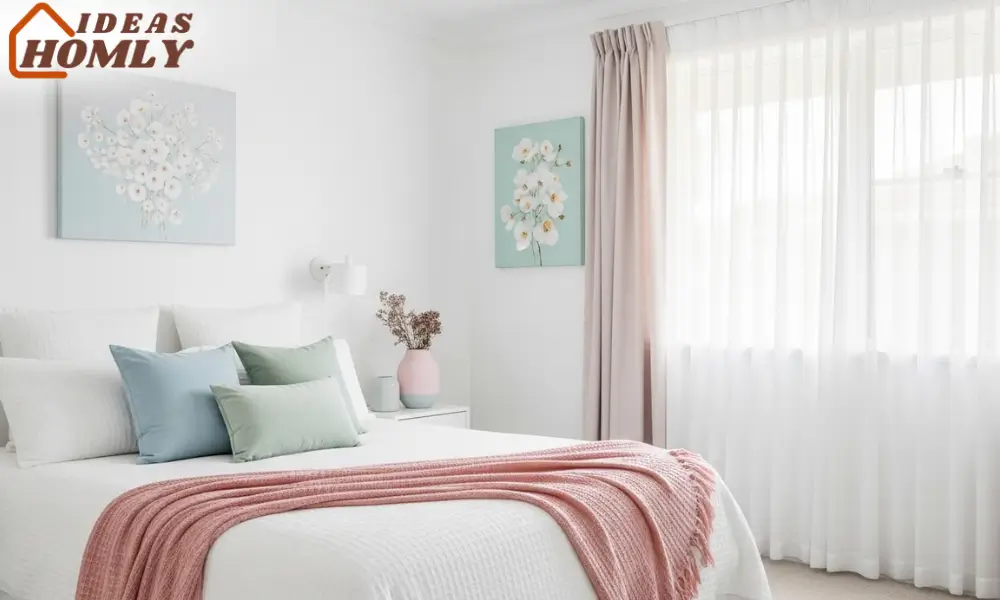
Best pastel + white pairings:
| White Base | Soft Pastel Accent |
|---|---|
| White cotton bedding | Blush pink linen throw |
| White painted walls | Sage green bedside table |
| White area rug | Powder blue armchair |
| White curtains | Lavender tiebacks or tassels |
Pastels bring warmth without overwhelming the space. They’re gentle, airy, and honestly they just make you happy. And isn’t that the whole point of a bedroom?
Color Tips: Choosing the Right White Paint
Let’s be real. Picking the right white paint can feel like choosing between 27 shades of the same wedding dress. They all look white… until you see them on the wall.
The secret to getting it right? Undertones.
White paints come with subtle undertones; some warm, some cool. And trust me, that one little undertone can completely change how your room feels. I learned this the hard way after painting my bedroom in what I thought was a safe white. Turned out it had blue undertones and made the room look like a freezer.
So, here’s what works:
Warm Whites (for a cozy, welcoming feel)
- Sherwin-Williams Alabaster
- Benjamin Moore White Dove
- Behr Swiss Coffee
These whites have yellow or beige undertones that soften the overall look. Great for north-facing rooms or minimalist styles that still want warmth.
Cool Whites (best for ultra-modern or hot climates)
- Benjamin Moore Chantilly Lace
- Sherwin-Williams Extra White
- Farrow & Ball All White
These have blue or gray undertones. I recommend them only if you’re adding a lot of texture or contrast, otherwise the room risks looking flat and cold.
| Paint Name | Undertone | Best For |
|---|---|---|
| Alabaster (SW 7008) | Warm | Cozy bedrooms with soft lighting |
| Chantilly Lace (OC-65) | Cool | Bright, modern, minimalist spaces |
| White Dove (OC-17) | Warm-neutral | Classic, balanced white spaces |
My advice? Always test samples on multiple walls and watch them throughout the day. Light changes everything.
Conclusion
White bedrooms get a bad rap for being cold, but they don’t have to be. In fact, when styled right, white can be the most versatile and comforting backdrop in your entire home.
By layering warm tones, adding earthy neutrals, using contrast, playing with textures, and sprinkling in soft pastels, you can create a space that’s fresh, cozy, and totally you.
And if you’re anything like me, you’ll love how easy it is to swap styles whenever the mood strikes, all without repainting the whole room. White is timeless. You just have to know how to make it talk.
So go ahead give white another chance. With the right touches, it’s anything but boring.
FAQs
Start by layering warm-toned whites like cream and ivory. Add textures through rugs, blankets, and curtains. Include natural elements like wood or rattan to ground the room. Even one or two earthy accents can make a big difference.
Absolutely, yes. Black or charcoal furniture adds contrast and makes white pop. Just balance it with softer elements, think warm lighting, plush bedding, or natural fibers so it doesn’t feel too stark or cold.
Warm white lighting (between 2700K–3000K) works best. It softens the space and enhances cozy textures. Avoid cool or blue-toned bulbs they can make even warm whites feel cold and clinical.
Surprisingly, not really. With washable paint and easy-to-clean fabrics, white can be very manageable. Choose stain-resistant materials for bedding or rugs, and keep a soft cloth handy for regular dusting. It’s cleaner than you’d think!
Cream, beige, light gray, or pastel shades are perfect. If you’re feeling bold, go for soft sage or blush. Avoid stark bright white unless your room already has lots of warm textures, it can look too flat otherwise.

